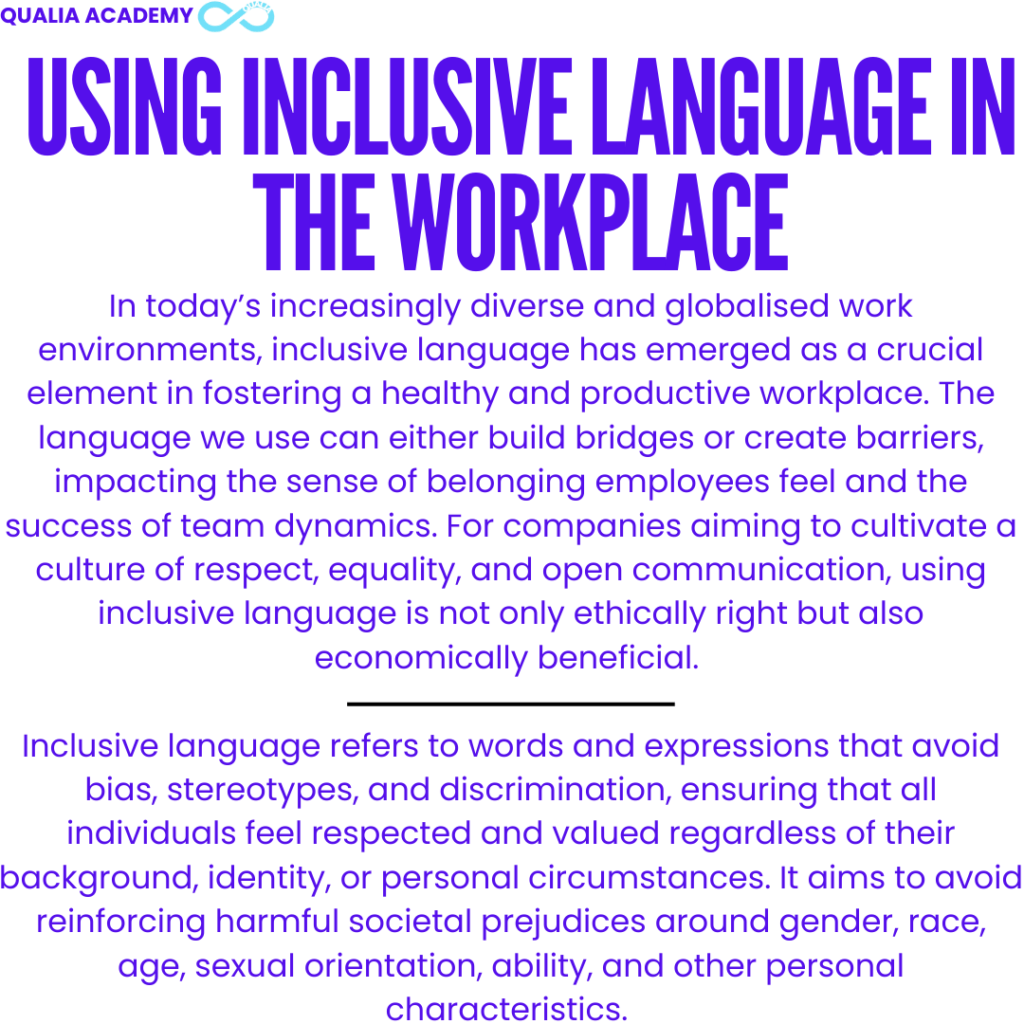Inclusive language in The Workplace has emerged as a crucial element in fostering a healthy and productive workplace. The language we use can either build bridges or create barriers, impacting the sense of belonging employees feel and the success of team dynamics. For companies aiming to cultivate a culture of respect, equality, and open communication, using inclusive language is not only ethically right but also economically beneficial.

In this blog post, we’ll explore the importance of inclusive language in the workplace, its benefits, and practical ways organisations can implement it effectively.
What is Inclusive Language?
Inclusive language refers to words and expressions that avoid bias, stereotypes, and discrimination, ensuring that all individuals feel respected and valued regardless of their background, identity, or personal circumstances. It aims to avoid reinforcing harmful societal prejudices around gender, race, age, sexual orientation, ability, and other personal characteristics.
For instance, rather than addressing a mixed-gender group as “guys,” which could unintentionally exclude or marginalise some individuals, more neutral terms like “team” or “everyone” can be used. Similarly, acknowledging someone’s preferred pronouns, such as “he/him,” “she/her,” or “they/them,” is a key aspect of inclusive language that fosters respect and validation.
Why Does Inclusive Language Matter?
Creating a Sense of Belonging
A sense of belonging is essential for employees to thrive at work. People are more productive and engaged when they feel respected, understood, and included. Inclusive language helps foster this by ensuring everyone, regardless of their identity, feels seen and valued. When employees are referred to with words that acknowledge their individuality and identity, it signals that the company is committed to inclusivity, which strengthens employee satisfaction and loyalty.
Supporting Diversity and Inclusion (D&I) Goals
Organisations with strong diversity and inclusion (D&I) policies understand that diversity extends beyond hiring practices. It must permeate everyday interactions and company culture. Inclusive language supports these D&I initiatives by removing biases from communication and ensuring that everyone has equal access to opportunities and decision-making processes.
For example, job descriptions often include gendered or exclusionary language without realising it. Terms like “ninja” or “rockstar” can unintentionally alienate candidates who may not resonate with these terms. By using more inclusive language in recruitment materials, organisations can attract a more diverse talent pool and foster a culture of equality.
Boosting Employee Engagement and Retention
Employees are more likely to remain loyal to a company where they feel respected and appreciated. Language plays a powerful role in shaping workplace culture. If an organisation uses inclusive language, it is more likely to have an environment where individuals feel comfortable sharing ideas, contributing to discussions, and participating fully.
In contrast, the use of exclusionary language can make some employees feel unwelcome or isolated, which can lead to disengagement and high turnover rates. By committing to inclusive language, companies signal that they value their employees’ diverse perspectives and contributions, ultimately leading to higher retention and improved morale.
Improving Team Collaboration
Communication is at the heart of effective teamwork. When teams communicate using inclusive language, they create an atmosphere of mutual respect, where all voices are heard and valued. This promotes collaboration, innovation, and problem-solving, as diverse perspectives are more likely to surface in an inclusive environment.
On the other hand, teams that unintentionally use biased or exclusionary language may find that certain members withdraw or feel sidelined, which can stifle creativity and inhibit the group’s potential to work together efficiently.
Enhancing Company Reputation
A company’s commitment to inclusive language not only affects internal dynamics but also how it is perceived by the outside world. Organisations that are seen as inclusive and progressive are more likely to attract a diverse range of customers, partners, and clients. By demonstrating a commitment to equality and respect in their language, companies enhance their reputation, which can lead to better business outcomes and a more positive brand image.
How to Implement Inclusive Language in the Workplace
Educate Employees:
The first step in fostering a culture of inclusive language is educating the workforce. Providing training and resources on what inclusive language is, why it matters, and how to use it is critical. Encourage employees to reflect on their own communication and make efforts to remove any unintentional biases.
Workshops, webinars, or e-learning modules on unconscious bias and inclusive language are effective ways to build awareness and encourage behavioural change.
Lead by Example:
Leadership plays a pivotal role in driving cultural change. When senior leaders and managers use inclusive language, it sets the tone for the rest of the organisation. Leadership should model inclusive behaviour in meetings, communications, and day-to-day interactions, signalling the importance of the initiative.
Review Workplace Materials:
Another practical approach is reviewing workplace materials, such as job descriptions, policies, internal communications, and external marketing content. By ensuring that these documents use inclusive language, organisations can avoid perpetuating stereotypes or biases. Additionally, organisations can implement language guidelines to help employees communicate in ways that align with company values.
Encourage Open Dialogue:
Creating an open dialogue around inclusive language is key to its success. Employees should feel empowered to discuss language use without fear of judgment. Offering channels for feedback and actively encouraging discussions around inclusivity can help identify areas for improvement and promote a more inclusive culture.
Moving Forward
The importance of inclusive language in the workplace cannot be overstated. It is a powerful tool that contributes to a more respectful, equitable, and productive environment. By embracing inclusive language, organisations show their commitment to diversity and inclusion, fostering a workplace where everyone feels valued and able to contribute their best. For businesses seeking to enhance employee engagement, improve retention, and maintain a strong reputation, inclusive language is a critical component of success.









